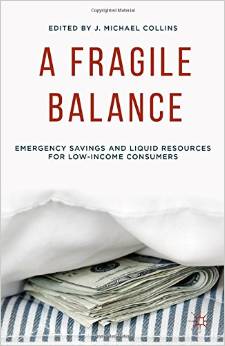
New Books of Note
Several new books are pertinent to topics frequently covered by this blog. Three worth noting are about low-income savers, older workers, and small employers with retirement plans that are overdue for an upgrade.
Here are brief descriptions:
- “A Fragile Balance: Emergency Savings and Liquid Resources for Low-Income Consumers:”
 For low-wage workers in fast food, retail, and similar jobs, just finding enough money for living expenses is like squeezing blood from a turnip. Research shows that many want to save, and the absence of this backstop only increases their financial fragility. The default is often to resort to high-cost debt, which further confounds their ability to pay the bills, much less weather the next emergency such as a car repair.
For low-wage workers in fast food, retail, and similar jobs, just finding enough money for living expenses is like squeezing blood from a turnip. Research shows that many want to save, and the absence of this backstop only increases their financial fragility. The default is often to resort to high-cost debt, which further confounds their ability to pay the bills, much less weather the next emergency such as a car repair.
Finding effective savings interventions to help low-wage workers may be the toughest personal finance challenge there is. It’s also the mission of the Center for Financial Security at the University of Wisconsin in Madison and its director, J. Michael Collins. In this volume, edited by Collins, leading researchers review various interventions and policies – from mortgage reserve accounts and impulse saving to programs that encourage low-income workers to save their tax refunds. [Watch for future blogs about specific findings in this volume.]
- “Unfinished Work: The Struggle to Build an Aging American Workforce:”
 Joseph Coleman’s well-written book is a global tour of the triumphs and challenges facing older workers. He doesn’t make any big points. He just tells good stories – about a 90-year-old parking attendant at a California hospital, a 62-year-old Ohioan working for an agency that helps other low-income seniors like herself find work, or a very relieved 57-year-old Illinois man who finally landed a sales job after three years of unemployment.
Joseph Coleman’s well-written book is a global tour of the triumphs and challenges facing older workers. He doesn’t make any big points. He just tells good stories – about a 90-year-old parking attendant at a California hospital, a 62-year-old Ohioan working for an agency that helps other low-income seniors like herself find work, or a very relieved 57-year-old Illinois man who finally landed a sales job after three years of unemployment.
The author takes readers overseas to describe the challenges of Europe’s graying population and to meet Japanese women in an aging town who earn income by picking flowers, herbs and garnishes for sale. The author also explores Sweden’s employer-union-government support system for laid-off workers searching for a new job – a sharp contrast to our sink or swim prescription for older workers in this country.
- “Simple Steps to Success:”
 To help small companies improve their employees’ retirement security, financial adviser Mark Zoril has written an e-book and is making it available here briefly for free. Unlike major corporations, he writes, firms with fewer than 500 workers often do not have an employee whose sole job is managing the retirement plan. He has seen first-hand how an understandable lack of expertise and resources can lead to excessive fees.
To help small companies improve their employees’ retirement security, financial adviser Mark Zoril has written an e-book and is making it available here briefly for free. Unlike major corporations, he writes, firms with fewer than 500 workers often do not have an employee whose sole job is managing the retirement plan. He has seen first-hand how an understandable lack of expertise and resources can lead to excessive fees.
Although Zoril wrote the book to promote his Minneapolis company, he said most small employers need to do the same things to minimize fees, which employees typically pay out of their investment portfolios. First, put the retirement plan business out for bid so companies compete for it – small firms often fail to shop around. Second, avoid paying fees for recordkeeping and investment services that are calculated as a percentage of plan assets – the dollar fees increase as plan assets grow. Instead, hire service providers, such as recordkeepers, on a flat-fee basis for each service provided. Finally, invest in low-cost index funds or exchange traded funds. Zoril said most plans should aim for reducing their fees to one-half of 1 percentage point per participant.
Comments are closed.







I find it ironic that a book (a culmination of academic papers funded through grants and foundation money) on the topic of helping low-income earners to save, itself costs over $100. Obviously it wasn’t written for those it is intended to help.